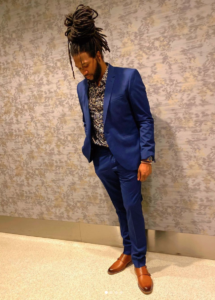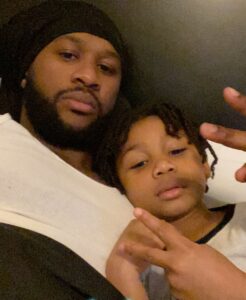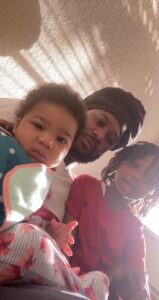“I used to do what I did for me but now I put myself in the backseat and I do for them”
-Robert Seide on Being a Black Father

As an (almost) 30 year old (give me these last few months y’all), I have encountered various types of black men over the years. Fathers, uncles, brothers, friends, lovers, teachers, coworkers–you name it. And while the majority of them would blend in with the next, on some rare occasions, there were ones who would stand out.
Whether it be for their morals, their decency, kindness or just overall character…they would stand out.
And when I joined Dear Fathers, and petitioned to tell stories about Fathers and their mental health, these were the men that I went in thinking about.
These strong black men who (gasp) also happened to be Fathers.
These strong black men that I knew without a doubt we’re going to leave their mark on their children and thus the world tenfold.
Today, I want to share with you the story of one of these men and a very dear friend to my family, Robert Seide.

Robert Seide is a 31-year-old black husband and father. With a gorgeous wife and two beautiful children (Champ, 5 and Harper, 4 months), he works in the nuclear power industry as a technician.
Robert has grown alongside my brother and I since we were young children and as my brother’s best friend, he’s seen it all! The family drama, the personal drama, the growth, the setbacks, the weddings, the kids–everything. And, as friendship would have it, we’ve seen the same on his side.
What stood out to me about Robert though is that when my brother, his best friend, had to deal with the heavy blows of life such as incarceration and drugs, there was no truer friend. When he needed money or a place to stay, Robert was there. When things got tough, Robert was always there.
Now, I was a crappy sister. And I say this with confidence because there were COUNTLESS times that I would hear of something Robert did and say “wow, not me”! But he did it.
That’s why Robert Seide has left a mark on me–he taught me the lesson of what it means to be a friend. What it means to love a friend irrevocably.
What makes me value this lesson all the more is that Robert didn’t come from a perfect background or perfect family. As a black boy growing up in America, he’s had to deal with his share of hardships. Such as growing up without a father. And yet he’s steadfast in who he is and has grown with values and morals that are at the bedrock of the black community: love, respect and unity.
This is why Robert’s take on black Fatherhood and mental health was one of importance to me. He shows that your upbringing doesn’t have to define you. No matter what you “lacked” in your childhood, it’s up to you to show yourself and your children your worth.
Read on to see more of my profound conversation with him.
So Robert, tell me about your Father. Is he still in your life?
“No, my father passed away.”
What was the relationship like between you two?
“We were cordial but we never really talked. I grew up without him.”
I never understand how parents can fully step away without looking back and chalk it up to it being their own inner battles.
“It’s funny, you know, I never resented my father for that though. He’s a human just like I’m a human and life takes its course. Whatever battles he dealt with…maybe it was easier for him to leave.
At the end of the day, the ultimate goal in life is happiness.
Do what you need to do to be happy.”
How was it growing up without a father figure?
“It was pretty tough. As a child growing up, when you don’t have it, you’re not used to it. It’s one thing if you had it and lost it.
But it’s not until you become an adult or teenager that you really start to notice it. But before that, it never bothered me. But as an adult now I can see what I could’ve achieved had I had that father in my life.
With my siblings, my sisters have been institutions where they needed to be protected and my brothers felt as though we had to step up for them but we could only do so much.
This made my brothers and I feel as though we had to grow up a lot faster than we needed to.
I started working at 15 when the legal age was 16. Because I felt as though I had shoes to fill in order to help my mom. So instead of picking up extra curricular activities, I picked up jobs.
Im 31 years old and I’ve already been working for more than half my life.”
How did your mother have to step up?
“My mother had some big shoes to fill. I’m a child of 5. She tried to be tough on us and wear both shoes. She tried her best but she couldn’t do it. Most of my role models came from TV or gentlemen I see in the streets.
How to tie a tie, how to present yourself in public, how to deal with women, how to work on a car. I learnt how to tie a tie from being in a program called 5000 role models.”
Did you have trouble managing your emotions growing up?
“Not me but the people around me did. But as boys you know, we also just didn’t really show our emotions or felt like we couldn’t.”
So you guys are going through these things growing up, and felt as though you weren’t supposed to show emotion. Was mental health ever discussed in your household?
“I actually never even heard of the word mental health until after high school. I never knew it was a thing.
When I first heard it, I thought it was just an excuse. I thought it was a way for people to say “I do what I do because I’m not right in the head or with myself”. I never knew what the real thing was.
I educated myself on it because I started looking up more stories because I’ve been through a few things myself. And I learnt there are different avenues and interpretations for mental health. There are things you can go through in life to make you think different, act different and it made me realize that it’s a real thing.”
Did that make you look at your own mental health and explore healing that?
“You know, my brother and I were having a conversation on this recently and he mentioned how hurt he’s been.
He smokes so he does that at times to reflect on what he’s been through but he realized what he lacks in, from not having a father and with me I’ve been through situations myself that made me realize that I need to focus on my mental health.”
Society tells us that men aren’t allowed to show emotions. Especially black men. To me, smoking seems like the loophole of men being able to share and not be a “b—-” for lack of better terms. Have you leaned on drugs to share your emotions?
“I drink but I don’t think I ever used it as an escape. If anything, when I’m dealing with someone, I like to stay busy and occupy my time and that’s how I make amends of what I’m going through.”
How did it feel becoming a father knowing the challenges that laid ahead after having your own experience?
“When my son was first born, I was speechless. I was so happy and grateful. It was amazing and I was just so focused on loving him and giving him everything I didn’t get. But sometimes I get so caught up in trying to prove that I could be the best father than actually being the best father.”
How did you bring all of that into being a father and how you show up for your children?
“As I grew up, I was able to dissect and see what I lacked and what others gained from having a father. One thing about me is that I learn a lot from watching.
I’m going day by day and giving my kids everything I didn’t have.”

What are you trying to instill in your children now?
“How to deal with your emotions. How to conduct yourself when you’re happy, angry. Think first before you act or react and the basic mannerisms that I missed out on.
The thing about my son is that I have a certain way I discipline my child. When he does something bad, I have a conversation with him.
“You know what you did?”
“You know why you did it?”
“You know that was bad?”
And I explain to him why I have to whoop him.
I make sure he has a clear understanding of why he did it. It’s important to me to have a conversation with him but sometimes I also do just have to get the belt.” *laughs*
How do you pull yourself off overthinking fatherhood and instead be present?
“I try to stay away from making him do things that I want to do . When it’s fun time, i ask what he wants to do and not what I want to do.
If we go outside and I want to play football but he wants to play with the soccer ball, I let him play with that.”
Did having your kids change your mental health?
“Definitely definitely. My entire life growing up I was always the center of attention and was put first or I put myself first. I mean did do for others but i put myself first in the sense of I did what i wanted to do when I wanted to do it and now with having kids, I put myself in the backseat and I do for them. And it’s funny because people hear that and they think it’s something negative but it’s something that I enjoy doing.”
As a parent so much of our joy comes from seeing our children lean into their gifts and what we can provide for them. For you, this must be even heavier of having a stable parent household after coming from without
“I sit there and watch my kids every day and the feeling from the sunrise to the sunset is “damn how do you not want to be around this?”
All the love I didn’t get from him…I just pour into my kids.”
When your kids are 18 and leaving, what do you hope they’re saying about you?
“I hope they say “their dad did a great job” instead of “he did the best he could.”
What makes you feel insecure about being a good father?
“My work schedule. I work 3 months and then off 3 months. So every time I come back home, I have to reset.”
Do you like what you do for work?
“I’m an RST (reactive service technician) and I love what I do. I’ve been to 41 states and I love traveling. It’s a great job but with having 2 kids…I’m starting to lose the stability.
I’ve had them go with me before but it’s just not fair. I don’t want to stop their lives.
I’m going to switch professions but not sure just yet which option I’m going with.”
How do you balance being away from them for 3months at a time?
“Thank God for Facetime. I’m facetiming morning, noon and night. Not much else I can do.
My son is funny though, he’ll send me text messages and I’ll text him back but he’s still learning to read. “
Tell me more about Champ, 5, and Harper, 4 mos.
“Champ is a growing boy. I like him because he reminds me of myself. He’s crazy about his momma like I was. I’m definitely a mama’s boy. Every time I leave I tell him he has to take care of his mama and he takes that to heart. He just got his report card and got all E’s. That was new to me. I’m looking like what is E? But they told me that was excellent and he made the honor roll so I’m proud of him.
Harper does it all. She’s rolling over and smiling all day. She’s a happy baby and a daddy’s girl.”
What’s your favorite thing about being a dad?
“Harper’s too young to talk but just hearing my son being grateful for the things I do and him saying “he wants to be me”. He wants a haircut so bad but doesn’t want to cut it because he wants to be like me.”

What goals do you have for yourself and your family?
“Just creating more stability. I just had a friend sit me down and show me the real things in life: having health insurance, life insurance, and how to set your family so that they can have what I didn’t have. Make sure they have some sort of platform when I go on so that’s the main thing.”
Do you plan on making mental health a part of your conversations with your children going forward?
“Oh yes, without a doubt. That’s something I’m working on now and he’s only 5 years old.
Again though, I’m still in the learning stage myself. I’m catching things he does wrong and working on his mental health afterwards. Now I’m in the phase of trying to approach and catch it beforehand.
I’ve been looking into different things people are ashamed of like counseling and I wouldn’t be afraid to go see a counselor or let him go see one if it’s needed because seeking advice is always good.
And I would love my son to be able to express himself and vent because that’s something I have no idea how to do.”
What advice would you give a new black father?
“Don’t give up.”
If you were to write a short letter to your father starting with “Dear Father,” what would it say?
“I have no idea. I’m actually with who I became so I would just simply say, ‘thank you.'”
You can find Robert :






